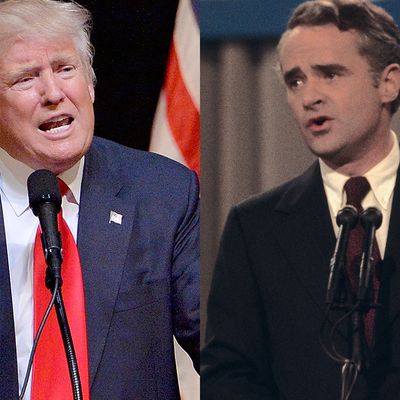
According to ABC’s Jonathan Karl, GOP pooh-bahs are so alarmed by Donald Trump’s post-convention behavior and the chaotic atmosphere inside his campaign that they are looking into what would happen if the wiggy dude actually withdrew from the presidential contest.
For the record, I think such speculation is almost certainly the product of wish projection by the many Republican elected officials who devoutly desire that Trump would just go away and let them reclaim “their” party in the name of conservative ideology or old-school Chamber of Commerce values or whatever. We’ve heard about his demise too many times to overreact to every report that his candidacy is dead or dying, particularly after a mere four or five days of disastrous missteps.
But just for grins, let’s take a quick look at what would happen if Trump announced he was canceling his presidential campaign like it was a summer TV show gone bad.
At the national level, the rules (it’s actually in RNC rule No. 9) are reasonably clear: If a presidential nominee dies or withdraws, the RNC is empowered to replace her or him via one of two methods: (1) a vote by the RNC itself in which each state would cast the same number of votes as it possessed at the recent national convention, or (2) an actual reconvening of said convention.
There would obviously be significant pressure on the RNC from the abandoned Trump supporters to follow the latter route so they could nominate Jeff Sessions or Gary Busey or whomever. But it would be a logistical and political nightmare. Besides, why should the RNC defer to the same delegates who made such a poor choice the first time around?
It’s unclear to whom the RNC would turn if it did itself name a replacement candidate; the obvious choice would be Paul Ryan, if he were willing to accept the poisoned chalice. Another approach would be to elevate Mike Pence, a transitive if very recently minted Trumpite who at least was approved by the convention for the national ticket. Sure, that would make a guy who was probably heading for a loss in a gubernatorial contest in a red state the party’s national leader, and would also produce another vacancy on the ticket that the RNC would have to fill. But a party abandoned by its own nominee would be beggars, not choosers. The one thing that’s clear is that the nominee would have to be approved by a majority vote, which would probably rule out someone like Ted Cruz.
The iffier proposition is ensuring that the new ticket is substituted for the old one on 50 state ballots. The only recent precedent was the incident in 1972 when Democratic vice-presidential nominee Senator Tom Eagleton resigned from the ticket on July 31 after revelations that he had a bunch of drunk-driving citations (or, as Hunter Thompson put it at the time, was “a man who didn’t mind taking 13 or 14 tall drinks now and then”) and had undergone electroshock treatment on multiple occasions. The Democratic National Committee replaced Eagleton with Sargent Shriver, and aside from making a ton of “McGovern-Eagleton” signs and buttons instant collector’s items, the substitution was recognized by every state. If a Trump resignation and replacement were to happen this month, that’s probably how it would go down again.
The real trouble would begin if the resign-and-replace saga drags into that gray zone where states are printing ballots to send to absentee or by-mail voters. There are plenty of incidents (though not at the presidential level!) where dead candidates have been kept on the ballot and have even won, most recently in Missouri in 2000, when Governor Mel Carnahan defeated John Ashcroft in a Senate election held a couple of weeks after he died in a plane crash. In that case, the posthumous candidacy was mitigated by the public announcement by Carnahan’s successor as governor that his widow would be appointed to the seat in his stead.
The odds of Trump staying in the race and then withdrawing so late as to present this kind of problem are significantly lower than the already very long odds that he will do anything other than stick to his candidacy until the bitter end and perhaps beyond (if his preemptive talk about the election being “rigged” is any indication of his intentions). If Trump does in fact withdraw very late, then it will mostly supply support to another conspiracy theory: that the mogul is a Democratic double agent.






























